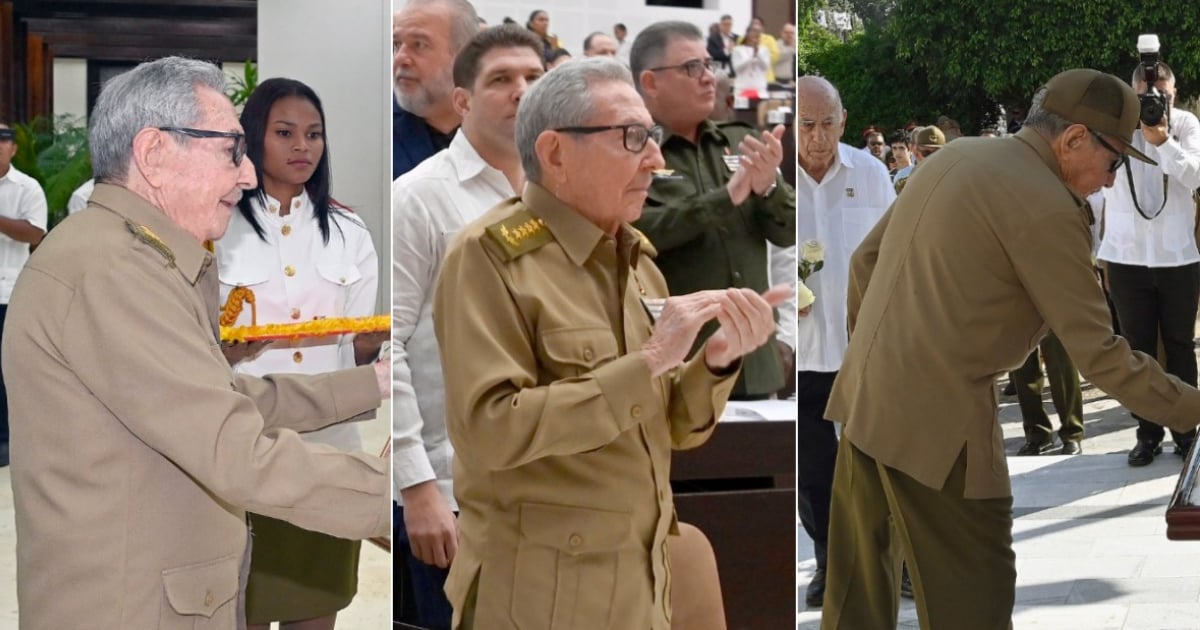
Related videos:
At 93 years old, Raúl Castro has significantly increased his public appearances in recent months, marking a notable shift from his previously reserved profile in past years.
This increase in their public activity coincides with the worsening economic and social crisis in Cuba, raising speculation about the reasons for their noticeable presence during critical times for the country.
In recent days, Raúl Castro attended the Cuban Parliament, where he instructed lawmakers to stand and raise their fists in a symbolic display of unity and strength reminiscent of similar gestures from last year.
In addition, he presided over a posthumous tribute to Commander Camacho Aguilera, alongside Miguel Díaz-Canel, at an event that highlighted his ongoing prominence in high-profile military and political ceremonies.
In the social sphere, Castro presented official recognitions, reaffirming his ceremonial role at key events.
Recently, he visited a special school to present a more relatable image to the community and to vulnerable populations.
On the diplomatic front, he met with a foreign military delegation alongside Díaz-Canel, underscoring his continued influence on the country's international relations.
This resurgence of activities began to become apparent in September, when Raúl Castro reappeared at the funeral of General Espinosa Martín, and later in October, when he received a high-ranking Russian official.
Since then, their presence at public events has become more frequent, marking a shift from their previous sporadic and reserved role.
The context of these appearances coincides with a period of discouraging news for the Cuban population. The regime has acknowledged the lack of progress in the economic plans for 2025, while blackouts and the energy crisis persist with no solutions in sight.
This critical scenario may be driving Raúl Castro to seek to project stability and leadership at a time of evident institutional fragility and government discredit.
Overall, these actions seem to reflect a strategy aimed at strengthening the image of the historical leadership of the Communist Party at a time when the regime's legitimacy is facing increasing challenges.
Raúl Castro's repeated appearances aim to convey a message of continuity and control amid an uncertain landscape for Cuba.
Frequently Asked Questions about the Current Situation in Cuba and the Role of Raúl Castro
Why has Raúl Castro's public visibility increased?
Raúl Castro has increased his public presence coinciding with the worsening economic and social crisis in Cuba. There is speculation that this rise in his appearances aims to convey a message of continuity and stability during a critical time for the Cuban regime, as the legitimacy of the government faces growing challenges.
What do Raúl Castro's recent appearances at public events symbolize?
Raúl Castro's appearances aim to underscore his symbolic role within the Cuban system. Amid a severe economic and social crisis, his presence at public events seeks to reinforce the image of the historical leadership of the Communist Party and project a sense of control and continuity.
What is the current context of the crisis in Cuba?
Cuba is experiencing a severe economic and social crisis marked by power outages, shortages of food and medicine, and a lack of progress in economic plans. These difficulties have intensified pressure on the government, which is facing increasing discredit and challenges to its legitimacy.
What role does Raúl Castro play in Cuba's international relations?
Raúl Castro continues to play a significant role in the diplomacy of the Cuban regime. His recent meetings with delegations from China, Russia, and Vietnam underscore his ongoing influence in Cuba's international relations, particularly in seeking economic and political support during the current crisis.
Filed under: